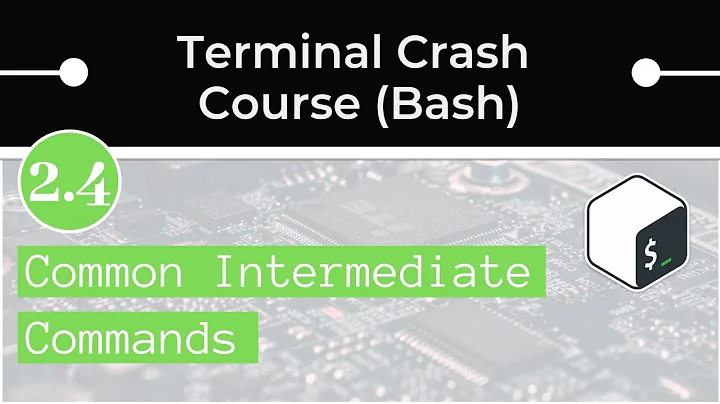grep inside less?
Solution 1
less has very powerful pattern matching. From the man page:
&patternDisplay only lines which match the
pattern; lines which do not match thepatternare not displayed. Ifpatternis empty (if you type&immediately followed by ENTER), any filtering is turned off, and all lines are displayed. While filtering is in effect, an ampersand is displayed at the beginning of the prompt, as a reminder that some lines in the file may be hidden.Certain characters are special as in the
/command†:
^Nor!Display only lines which do NOT match the
pattern.^RDon't interpret regular expression metacharacters; that is, do a simple textual comparison.
____________
† Certain characters are special if entered at the beginning of thepattern; they modify the type of search rather than become part of thepattern.
(Of course ^N and ^R represent Ctrl+N
and Ctrl+R, respectively.)
So, for example, &dns will display only lines that match the pattern dns,
and &!dns will filter out (exclude) those lines,
displaying only lines that don't match the pattern.
It is noted in the description of the / command that
The
patternis a regular expression, as recognized by the regular expression library supplied by your system.
So
-
ð[01]will display lines containingeth0oreth1 -
&arp.*eth0will display lines containingarpfollowed byeth0 -
&arp|dnswill display lines containingarpordns
And the ! can invert any of the above.
So the command you would want to use for the example in your question is:
&!event text|something else|the other thing|foo|bar
Also use /pattern and ?pattern
to search (and n/N to go to next/previous).
Solution 2
Building on orion's answer, the less(1) man page describes
/patternSearch forward in the file for the N-th line containing the
pattern. N † defaults to 1. Thepatternis a regular expression, as recognized by the regular expression library supplied by your system. The search starts at the second line displayed (but see the-aand-joptions, which change this).Certain characters are special if entered at the beginning of the
pattern; they modify the type of search rather than become part of thepattern:
^Nor!Search for lines which do NOT match the
pattern.^Eor*Search multiple files. That is, if the search reaches the END of the current file without finding a match, the search continues in the next file in the command line list.
^For@Begin the search at the first line of the FIRST file in the command line list, regardless of what is currently displayed on the screen or the settings of the
-aor-joptions.^KHighlight any text which matches the
patternon the current screen, but don't move to the first match (KEEP current position).^RDon't interpret regular expression metacharacters; that is, do a simple textual comparison.
____________
† Commands may be preceded by a decimal number, called N in the descriptions …
(Of course ^N and ^E, etc., represent
Ctrl+N and Ctrl+E, etc.)
It turns out that &pattern
and /pattern work well together.
For example, the commands
-
&!arp|dnsEnter -
/Ctrl+Kfail|fatal|fault|sd[a-z][0-9]Enter
typed in either order, will hide (exclude) all lines
containing arp or dns (like grep -v), and then, in the remaining lines,
highlight all occurrences of fail, fatal, fault,
or anything that looks like the name of a SCSI device (sd[a-z][0-9]).
Note that lines that contain arp or dns,
and also fail or any of the other danger words,
will not be displayed.
Solution 3
Over the last few months, I have become somewhat enamoured of fzf.
In your case, as long as context is not needed (i.e., the equivalent of grep's -A, -B, or -C is not needed, and by the way, less's & also has the same limitation), then fzf is a very powerful tool.
Here's a silly example:
printf "%s\n" {aa,bb,cc}{dd,ee,ff}{gg,hh,ii} | fzf
If you run that, and play with inputs like aa | bb dd | ee !gg !hh and so on, you will quickly see what is happening.
Fzf's documentation on the | operator is sparse, but my best guess is it only applies to the terms immediately before and after, which means, in effect, that OR takes precedence over AND (which is implicit; all terms are AND-ed by default). But in most cases this should not be an issue, and things work out OK in my experience.
Give it a shot. I have found it surprisingly useful when it comes to browsing things when I am not really sure what I am looking for, and when context does not matter.
Related videos on Youtube
Comments
-
 forquare almost 2 years
forquare almost 2 yearsI'm currently sifting through a lot of unfamiliar logs looking for some issues. The first file I look at is Events.log, and I get at least three pages in
lesswhich appear to display the same event at different times – an event that appears to be fairly benign. I would like to filter this event out, and currently I quitlessand do something likegrep -v "event text" Events.log | lessThis now brings a number of other common, uninteresting events that I would also like to filter out. Is there a way I can
grep -vinside ofless? Rather than having to doegrep -v "event text|something else|the other thing|foo|bar" Events.log | lessIt strikes me as a useful feature when looking at any kind of log file – and if
lessisn't the tool, is there another with the qualities I seek? Just aless-style viewer with built ingrep. -
 forquare over 9 yearsThis is almost there! In
forquare over 9 yearsThis is almost there! Inless, using '&!<1stpattern>' allows me to 'hide' lines with a pattern on, however it only applies to one pattern at a time, so if I find a second pattern and apply '&!<2ndpattern>', lines that matched the first pattern and were hidden, are now visible. So very close! -
 PM 2Ring over 9 years@forquare: There's a command history that you can access with the up & down arrows keys. So press
PM 2Ring over 9 years@forquare: There's a command history that you can access with the up & down arrows keys. So press&!and then press an arrow key. -
 PM 2Ring over 9 years@forquare: And I just discovered that the history is saved, so your old patterns will be available next time you run
PM 2Ring over 9 years@forquare: And I just discovered that the history is saved, so your old patterns will be available next time you runless; I don't know if it's preserved after rebooting, though. -
orion over 9 yearsIt is, the history is stored in
~/.lesshst. And yes, just group patterns just like you would in grep. -
 forquare over 9 years@orion that was the last bit I was missing - how to concatenate patterns together. I though I had tried the pipe symbol before and it failed, but now I try again it works! So: &!<pattern1>|<pattern2>|<pattern3> will remove lines with pattern1 or pattern2 or pattern3
forquare over 9 years@orion that was the last bit I was missing - how to concatenate patterns together. I though I had tried the pipe symbol before and it failed, but now I try again it works! So: &!<pattern1>|<pattern2>|<pattern3> will remove lines with pattern1 or pattern2 or pattern3 -
tedder42 over 9 yearsyou can also
grep foo | grep -v bar | less. -
spinlock about 9 yearsWhich version of less is this for? I'm on a Mac and I don't have it :( I've also tried installing the homebrew dupe but no love their either.
$less --version less 418 Copyright (C) 1984-2007 Mark Nudelman less comes with NO WARRANTY, to the extent permitted by law. For information about the terms of redistribution, see the file named README in the less distribution. Homepage: http://www.greenwoodsoftware.com/less -
spinlock about 9 yearsI figured it out. Homebrew dupes has the latest version. I just had to kick bash because it wasn't grabbing the right file (even though which told me it was grabbing /user/local/bin/less).
-
CGK almost 7 yearsMan, this should be taught together with the a-b-c.







